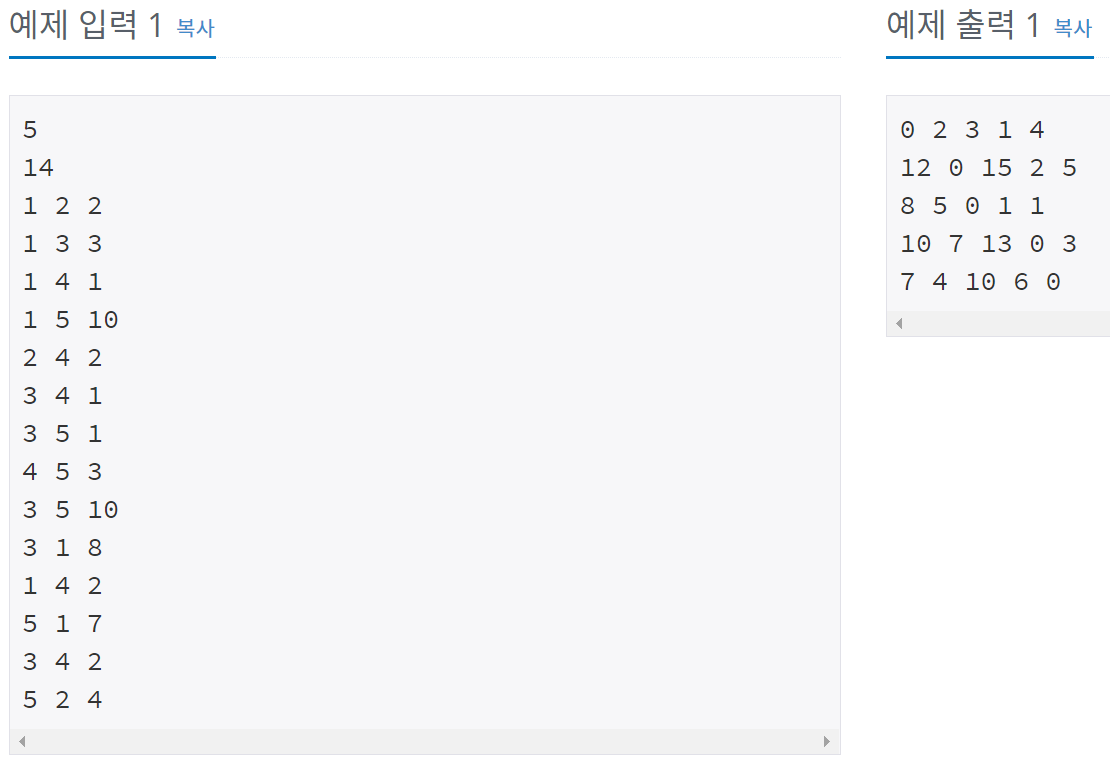
문제
n(2 ≤ n ≤ 100)개의 도시가 있다. 그리고 한 도시에서 출발하여 다른 도시에 도착하는 m(1 ≤ m ≤ 100,000)개의 버스가 있다. 각 버스는 한 번 사용할 때 필요한 비용이 있다.
모든 도시의 쌍 (A, B)에 대해서 도시 A에서 B로 가는데 필요한 비용의 최솟값을 구하는 프로그램을 작성하시오.
입력
첫째 줄에 도시의 개수 n이 주어지고 둘째 줄에는 버스의 개수 m이 주어진다. 그리고 셋째 줄부터 m+2줄까지 다음과 같은 버스의 정보가 주어진다. 먼저 처음에는 그 버스의 출발 도시의 번호가 주어진다. 버스의 정보는 버스의 시작 도시 a, 도착 도시 b, 한 번 타는데 필요한 비용 c로 이루어져 있다. 시작 도시와 도착 도시가 같은 경우는 없다. 비용은 100,000보다 작거나 같은 자연수이다.
시작 도시와 도착 도시를 연결하는 노선은 하나가 아닐 수 있다.
출력
n개의 줄을 출력해야 한다. i번째 줄에 출력하는 j번째 숫자는 도시 i에서 j로 가는데 필요한 최소 비용이다. 만약, i에서 j로 갈 수 없는 경우에는 그 자리에 0을 출력한다.
예제 입&출력

소스코드
import java.io.BufferedReader;
import java.io.IOException;
import java.io.InputStreamReader;
import java.util.StringTokenizer;
public class Main {
private static int n, m;
private static final int INF = 1_000_001;
private static int[][] dist;
public static void main(String[] args) throws IOException {
BufferedReader br = new BufferedReader(new InputStreamReader(System.in));
StringTokenizer st;
n = Integer.parseInt(br.readLine());
m = Integer.parseInt(br.readLine());
dist = new int[n + 1][n + 1];
for (int i = 1; i <= n; i++) {
for (int j = 1; j <= n; j++) {
if (i == j) continue;
dist[i][j] = INF;
}
}
for (int line = 0; line < m; line++) {
st = new StringTokenizer(br.readLine());
int start = Integer.parseInt(st.nextToken());
int end = Integer.parseInt(st.nextToken());
int cost = Integer.parseInt(st.nextToken());
dist[start][end] = Math.min(dist[start][end], cost);
}
floydWarshall();
for (int i = 1; i <= n; i++) {
for (int j = 1; j <= n; j++) {
if (dist[i][j] == INF) System.out.print(0);
else {
System.out.print(dist[i][j] + " ");
}
}
System.out.println();
}
}
private static void floydWarshall() {
for (int path = 1; path <= n; path++) // path : 거쳐가는 정점
for (int i = 1; i <= n; i++) { // i : 시작 정점
for (int j = 1; j <= n; j++) { // j : 끝 정점
dist[i][j] = Math.min(dist[i][j], dist[i][path] + dist[path][j]);
}
}
}
}
Comment
다익스트라알고리즘 : 한 정점으로 부터 모든 정점에 이르는 간선 정보(BFS)플로이드-와셜알고리즘 : 모든 정점으로 부터 모든 정점에 이르는 간선 정보(DP)
